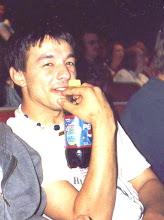Meth hits small towns, too (Oregon)
By KYLE ODEGARD
Gazette-Times reporter
Drug dog might sniff through school next year
MONROE — Methamphetamine doesn’t skip small towns.
Family nurse practitioner Susan Keister said she sees clients at the Monroe Health Center who were involved in meth, and even some suffering through withdrawal symptoms.
Monroe schools counselor Christina Walker notices the family instability of younger students whose parents may be on the drug — the days of school missed, the uncombed hair or other problems.
“You see the little signs of neglect,” she added.
Older students “talk about people around them using meth,” Walker said. “I hear more about marijuana and drinking than meth, but it exists.”
On Tuesday night, local officials talked about the drug during a forum in the Monroe High School gym. About 40 people attended the event.
Benton County sheriff’s deputy Jim Weikel and drug dog Bus (pronounced boose) gave a demonstration of a canine’s keen sense of smell.
Bus quickly found a stash of synthetic drugs that Weikel hid in the gym. The dog might become more familiar with the school soon.
Next school year, the German shepherd and Weikel will sniff for meth and other illegal substances stashed in hallway lockers and vehicles in the parking lot, said Superintendent Randy Crowson.
“We’re certainly going to use the drug dog. There’s no question about it. (The school) needs to be a place that’s clean,” he said.
Alsea School also is interested in the possibility of having Bus search for drugs, Weikel said.
According to the deputy, meth has become the drug of choice, and is found by local law enforcement more commonly than marijuana.
“It’s definitely a problem. It’s getting worse,” he said.
While Keister shared information about the health problems meth creates, representatives of the Benton County drug and alcohol program and juvenile court called the drug highly addictive.
“It’s not something you play with,” said Jim Gouveia, of the Benton County Health Department.
Gouveia said parents should look for changes in their children’s behavior and friends.
Andrew Abblitt, juvenile court councilor, said suspicious parents should ask their children if they are using drugs and gauge the response.
With adults, hyperactivity and sores on the face and arms can be signs of meth use. The drug also causes agitation and aggression.
Weikel urged residents not to ignore signs of meth.
“You are our eyes and ears in the community. … Let us know,” added Undersheriff Diana Simpson.
After the presentation, a few Monroe teens said that they didn’t think meth was that big of a problem in south Benton County.
“I really don’t hear anything or see anybody who uses it,” said Ellen Keas, 18, a Monroe High School junior.
Still, she thought the presentation was well done.
“We got a lot of information about it, the way people looked after they used it,” Keas added.
http://www.gazettetimes.com/articles/2006/05/25/news/community/thuloc02.txt


0 Comments:
Post a Comment
Subscribe to Post Comments [Atom]
<< Home